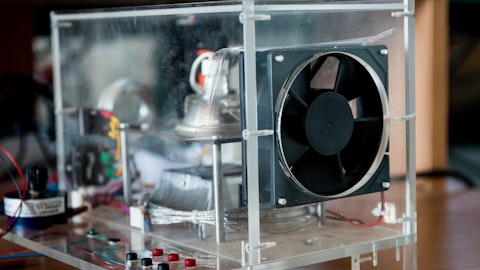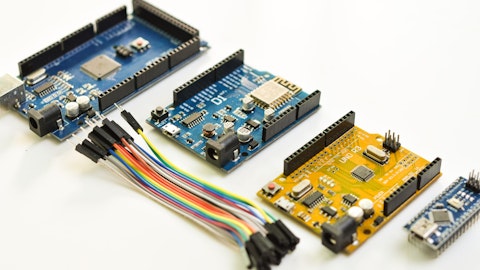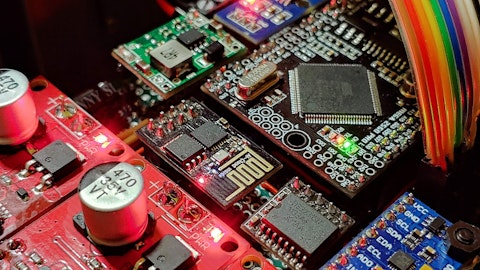Methode Electronics, Inc. (NYSE:MEI) Q3 2024 Earnings Call Transcript March 7, 2024
Methode Electronics, Inc. misses on earnings expectations. Reported EPS is $ EPS, expectations were $0.07. MEI isn’t one of the 30 most popular stocks among hedge funds at the end of the third quarter (see the details here).
Operator: Greetings. Welcome to the Methode Electronics Third Quarter Fiscal 2024 Results Conference Call. [Operator Instructions] Please note this conference is being recorded. I will now turn the conference over to your host, Robert Cherry, Vice President of Investor Relations. You may begin.
Robert Cherry: Thank you, operator. Good morning and welcome to Methode Electronics’ fiscal 2024 third quarter earnings conference call. For this call, we have prepared a presentation entitled fiscal 2024 third quarter financial results, which can be viewed on the webcast of this call or found at methode.com on the Investors page. This conference call contains certain forward-looking statements, which reflect management’s expectations regarding future events and operating performance and speak only as of the date hereof. These forward-looking statements are subject to the Safe Harbor protection provided under the securities laws. Methode undertakes no duty to update any forward-looking statement to conform the statement to actual results or changes in Methode’s expectations on a quarterly basis or otherwise.
The forward-looking statements in this conference call involve a number of risks and uncertainties. The factors that could cause actual results to differ materially from our expectations are detailed in Methode’s filings with the Securities and Exchange Commission, such as our 10-K and 10-Q reports. At this time, I’d like to introduce and turn the call over to Mr. Avi Avula, President and Chief Executive Officer.
Avi Avula: Thank you, Rob and good morning, everyone. Thank you for joining us for fiscal 2024 third quarter earnings conference call. I am joined today by Ron Tsoumas, our Chief Financial Officer. Both Ron and I will have opening comments and then we will take your questions. Before we discuss the quarter, I would like to share with you that I’m truly honored and humbled to be Methode’s third CEO in its 77-year history. I would also like to take this opportunity to thank Don Duda for his outstanding contributions to Methode and for his support during my transition and to wish him the very best in his retirement. A new chapter in the journey for Methode has begun, and I’m excited and energized by the possibilities ahead. I will provide a brief overview of the transition so far and also share some initial observations.
First, while I’ve only been on the job for just over a month, I visited a number of our facilities, met with many of our employees, visited with a major auto customer and have the opportunity to review the operating performance for all of Methode’s business units. I have been impressed with the talent in our organization the depth and breadth of engineering capability across the company and our strong customer relationships. Our company foundation is strong with a rich legacy of innovation and an unwavering commitment to excellence. I look forward to building on that foundation and charting our course towards even greater success for the organization. In the coming months, I look forward to meeting with investors and analysts to share more about my background and views on the business.
Let’s begin on Slide 5. Our sales for the quarter were $260 million, which were down $21 million year-over-year. The decline was entirely in our Auto segment across all three of our reporting regions. The decrease was primarily due to program roll-offs and EV demand weakness along with some continued softness in the e-bike market. Sales in the quarter were helped by the acquisition of Nordic Lights in the Industrial segment. The lower sales, along with the continued operational inefficiencies in our North American auto operations drove the net loss in the quarter. These are essentially the same operational challenges that we experienced and communicated to you in the first and second quarters of this fiscal year. We also continue to see increased costs related to our numerous new program launches, some of these costs are driven by a lack of absorption due to customer program delays.
We are taking actions to mitigate these launch costs, which range from customer reimbursement to internal cost reductions. Moving to orders. We had a modest quarter with over $20 million in annual program awards. These programs are spread across our user interface, lighting, power and sensor applications. I can share that the pipeline of potential awards remain healthy. However, I would note that the profile of the programs are weighted towards EV and consequently may be subject to reduction or delay due to customer decisions and/or market conditions. Turning back to EV activity. Sales in the quarter were 19% of our consolidated total, and year-to-date are at 20%. As previously communicated, we have a sizable EV lighting program in the process of rolling off, while we are also at the beginning of the wave of new EV power programs.
The consequence of this timing gap will be a period of lower EV sales before they rebound as we transition programs. All of this is taking place with the backdrop of a softening near-term outlook in the EV market. EV is clearly a long-term tailwind for Methode, but the path will certainly not be linear. In the quarter, our debt was flat sequentially from the second quarter. That leveling off was aided by a return to positive free cash flow. While we were challenged in the quarter with net income, we still maintain a sharp focus on cash generation. There is plenty of room for improvement on cash flow, but it was a step in the right direction. Lastly, we continued our share buyback in the quarter, acquiring $3 million in shares via our automated purchase program.

Turning to Slide 6. In summary for the quarter, sales were under pressure from auto program roll-offs and market headwinds in the EV, e-bike and data center markets. The lower sales volume and persistent operational inefficiencies in our auto segment drove a net loss. We returned to a positive free cash flow position, and we continued our share purchase program. Going forward, we have carefully considered the situation with our operational challenges, the evolving market headwinds and my recent appointment to the CEO position. Consequently, we decided to suspend all guidance for the near future. We intend to focus on planning and executing on our path forward to restoring profitability and cash generation for the company. We will undertake an intensive review and take quick actions to reduce hard costs, including head count and to dispose of noncritical and non-revenue-generating assets.
We will be laser-focused on reducing working capital, particularly inventory and increasing free cash flow. We have an engaged an outside cost reduction consultant to review our business operations and have delayed all merger and acquisition activity. In addition, we will perform a rigorous review of key operating procedures and processes. Lastly, we will perform an expeditious, but thorough review of the entire portfolio. We will then undertake — share an update on our business review and when we report fourth quarter earnings. I’m confident that the foundation of the business is strong and the potential for greater success is evident. The near-term path for the company will be heavily focused on cost reduction and operational effectiveness, but we will then quickly cover to strategic actions to take Methode to the next stage in its journey.
At this point, I’ll turn the call over to Ron, who will provide more detail on our third quarter financial results.
Ron Tsoumas: Thank you, Avi, and good morning, everyone. Please turn to Slide 8. Third quarter net sales were $259.5 million compared to $280.1 million in fiscal ’23, a decrease of 7%. This quarter sales included $21.2 million from the Nordic Life acquisition and $1.5 million from favorable currency translation. . Excluding Nordic Lights and foreign currency, net sales decreased by 15.5%. The quarter saw the continuation of two key auto program roll-offs, 1 in North America and one in Asia. We also had new weakness in EV demand and persistent softness in the e-bike and data center markets. The e-bike market continues to be in an overstock position. The data center market did show some signs of recovery for us. Third quarter loss from operations was $3 million, down from $27.3 million of income in fiscal ’23.
Income was down through the lower sales volume and the ongoing operational inefficiencies, which are mainly in North American auto and drove inventory adjustments, scrap expenses and higher labor and freight costs. We also saw higher costs in Europe due to the shipping constraints in the Red Sea. The adjusted loss from operations excluded $100,000 of restructuring costs. Please turn to Slide 9. Third quarter diluted earnings per share decreased to negative $0.33 from a positive $0.54 in the same period last fiscal year. The EPS was negatively impacted by the lower operating income and higher net interest expense. Lower tax expense compared to the prior fiscal year was a partial offset. The adjusted EPS rounded to the same number for GAAP this quarter.
We are laser-focused on cost reductions and their related cash impacts. Shifting to EBITDA, a non-GAAP financial measure, third quarter EBITDA was $9.4 million versus $36.1 million in the same period last fiscal year. EBITDA was negatively impacted by lower sales volume, lower gross profit and higher selling and administrative expenses. The higher selling and administrative expenses was primarily due to the acquisition of Nordic Lights, which accounted for $2.4 million of the increase. Excluding Nordic Lights, selling and administrative expense decreased $1.4 million, primarily due to lower stock-based compensation expense, partially offset by higher professional fees, incentive-based compensation and salary expense. The adjusted EBITDA excluded $100,000 of restructuring costs.
Please turn to Slide 10. While gross debt is up $24.5 million year-to-date, it was down $700,000 from the second quarter. The year-to-date increase was mainly due to working capital investments and higher CapEx, both to support sales and new program launches. We ended the quarter with $122.9 million in cash, down $34.1 million from the end of last fiscal year, but up $400,000 from the second quarter. Net debt, a non-GAAP financial measure increased by $58.6 million year-to-date to $208.4 million, but was down $1.1 million from the second quarter. Overall, we saw a stabilization in debt and cash levels in the quarter. After the end of the third quarter, we entered into an amendment to our credit agreement with our lenders. The amendment revises the debt-to-EBITDA leverage ratio covenant for the third quarter and our next three quarters.
The amendment waived any default that may have occurred due to the noncompliance with the leverage ratio covenant for the third quarter that was in effect prior to the amendment. Following the amendment, we were in compliance with our leverage ratio covenant. For further information, please see our 8-K and 10-Q, which were both filed today. Please turn to Slide 11. Third quarter net cash from operating activities was $28.8 million as compared to $55.7 million in fiscal ’23. The decrease of $26.9 million was primarily due to lower net income in the quarter. Third quarter capital expenditure was $16.6 million as compared to $12.8 million in fiscal ’23, an increase of $3.8 million. The increase was mainly a function of investments required to support new product launches and was keeping with our prior guidance.
Third, fourth quarter free cash flow, a non-GAAP financial measure was $12.2 million as compared to $42.9 million in fiscal ’23, a decrease of $34.7 million. This decrease, again, was primarily due to reduced net income and increased CapEx. After having negative free cash flow in the first two quarters of the year, we returned to positive free cash flow in the third quarter. That concludes my comments, and we can open it up for questions.
See also 13 Best Pharma Dividend Stocks To Buy in 2024 and 11 Best Small Cap Pharma Stocks to Invest In.
Q&A Session
Follow Methode Electronics Inc (NYSE:MEI)
Follow Methode Electronics Inc (NYSE:MEI)
Receive real-time insider trading and news alerts
Operator: [Operator Instructions] Your first question for today is from Luke Junk with Baird.
Luke Junk: Good morning — for taking the questions. First one either for Avi or Ron, just to start, you were expecting modestly higher EPS sequentially month or so into the quarter when you gave that guidance. That would seem to suggest trends distorted pretty materially in December and January. I know you’re not providing guidance right now, but just hoping you can speak to where the organization stands on a run rate basis. I’m thinking both in terms of top line headwinds, especially the EV moderation that you called out and then the operational inefficiencies to what extent things were similar sequentially or if there’s any deterioration in the auto segment? Thank you.
Avi Avula: Luke, let me start with my view and then I can let Ron jump in as well. As we’ve shared that the softness was coming from the auto market mainly across our businesses worldwide, primarily because of some slowdowns in EV demand rate and our customers. And really, that’s where we are seeing some short-term softness as we go into it.
Ron Tsoumas: Yes. Luke, from where we were when we gave our guidance to where we ended up, sales were definitely softer. As Avi mentioned, certainly the EV and some of the other data center space and things of that nature. We had operational inefficiencies as well that contributed to the delta in pre-tax. And we were encumbered with foreign exchange losses and some higher-than-expected professional fees.
Luke Junk: Got it. And then second, just a bigger picture question for you, Avi. With the organization in a challenging place right now, can you just help us understand your first 90 days on the job that you’re in the middle of, you gave some high-level perspective in your prepared comments. Just want to better understand how you’re prioritizing your time right now. What if any structures you’ve put in place already with your leadership team or anything else that would be worth mentioning. Thank you.
Avi Avula: Yes. Luke, I’ve just been here a month and I’ve taken some time to assess where we are. And while I still yet to see all our sites, I’ve got a good sense of the current business and where we are. My priorities are to recover profitability and our path there before we can embark on our long-term strategic journey. And this is also why we have pulled guidance because I want to come back to you when we have an idea of all the actions we are taking that we can share more about. But the long-term, my view is to build a future for the company and that’s based on the foundation we have today and take it into the future.
Luke Junk: And then last question for me just would be on the balance sheet, Ron, and maintaining compliance with the updated covenants that give you some breathing room looks like through the middle of fiscal ’25. Just be great to get some perspective on that and maybe even just the calculation that ratio, it seems like you might be contemplating repatriating some cash. Is that right? Any other considerations? Thanks.
Ron Tsoumas: Thanks, Luke. Yes, our third quarter results underperformed compared to guidance from sales and EPS and EBITDA perspective. And we then entered into negotiations with our lending group. And we reached an agreement to go from 3.25 was the standard covenant we were in compliance in the third quarter. The first quarter — the fourth quarter goes to 4.5. The first quarter and the second quarter of next fiscal year goes down to 4 in each of those quarters. And then as you correctly mentioned, in our third quarter of next year, we would revert back to the 3.25 that was in the standard agreement when we amended the facility in October of 2022. As Avi mentioned, we are taking multiple actions to increase our cash generation and EBITDA performance because both of those levers as you correctly mentioned, look on repatriation and things of that nature, that is a lever that we can pull to take down the net debt, which is the other part of the equation.
Luke Junk: Got it. I will leave it there for now. Thank you.
Operator: Your next question is from Gary Prestopino with Barrington Research.
Gary Prestopino: Hey, good morning all. Hey, Avi, welcome to the show. Hey, could you maybe tell us in your capacity, and I only have some of your experience with DuPont’s Electronics and Industrial business. But in your professional experience, have you been faced with the situation like you’re getting here at Methode that you had to turn it around in kind of a quick fashion, right-size the organization and then drive profitability over time.
Avi Avula: Gary, nice to meet you. Thank you for that question. I was not a CEO before, but as I came into different businesses in DuPont, I had an opportunity to restructure and reposition for growth with businesses that were declining in revenue, but we then put it onto a significant growth trajectory, both organically and inorganically. And there’s a lot of learning from there that I can bring and learning from elsewhere to bring on future growth for the company.
Gary Prestopino: Okay. So when you were at DuPont, you were kind of passed — you weren’t the CEO, but you’re obviously running a division, the electronics and industrial business, and this was an area that kind of had somewhat of the same characteristics as Methode does now and you were able to turn it around.
Avi Avula: Yes. I would say that they’re not exactly similar, but there’s learnings from both to bring to the company here, where there are declining trends where we put in on a turnaround trajectory, where we also lived both on the bottom line and the top line to do better performance.
Gary Prestopino: Okay. Thank you very much.
Operator: [Operator Instructions] Your next question is from John Franzreb with Sidoti & Company.



